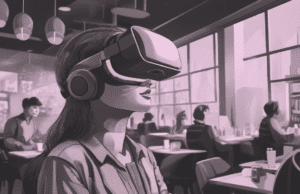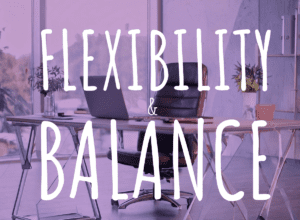As a tech company specializing in virtual reality (VR) training for restaurant employees, we’ve seen firsthand how the changing workforce demands new approaches to learning and development, as I’m sure you did too. The most significant shift? The rise of Gen Z (born between 1997 and 2012) as a powerful force in the QSR industry. Their characteristics and behaviors differ markedly from previous generations, and to keep them engaged and productive, employers need to adapt their training methods accordingly.
As the generation introduced the workplace more and more, we’ve been able to identify the key traits that defines them at work, and how VR training offers a perfect solution to meet their needs
Gen Z vs. Previous Generations: A Quick Overview
Before going into the specific needs of Gen Z, let’s first look at how they compare to earlier generations in the workforce—particularly Millennials (born 1981-1996), Gen X (1965-1980), and Baby Boomers (1946-1964).
- Millennials are known for valuing purpose-driven work, collaboration, and flexibility. They embrace technology in the realm of mobile apps and social media. They knew a life before tech as we know it today.
- Gen X is often characterized by their self-reliance and work ethic. They prefer clear structures and tend to stay longer with companies when they find stability and work-life balance.
- Baby Boomers value loyalty and tend to stay with one employer for a longer duration. They prefer traditional training methods like manuals or in-person instruction but have adapted to online learning platforms over time.
Key Characteristics of Gen Z at Work
Gen Z brings a fresh set of attitudes and behaviors that companies need to consider as a new reality, especially in industries with high turnover rates like the restaurant sector.
1. Digital Natives with High-Tech Expectations
Gen Z grew up with technology at their fingertips. From smartphones to virtual assistants, they are accustomed to quick access to information and immersive digital experiences. Unlike Millennials, who witnessed the transition to the digital age, Gen Z has known nothing else.
How VR Training Helps: VR offers the immersive, tech-driven environment Gen Z craves. Instead of sitting through traditional training videos or manuals, VR places them directly in real-world scenarios. For example, in a restaurant, they can practice handling a rush hour shift or learn proper customer service techniques without the pressure of real-time mistakes. This tech-forward training method aligns perfectly with their digital-first mindset.
2. Preference for Interactive and Engaging Learning
Gen Z has shorter attention spans compared to previous generations, likely due to their constant exposure to fast-paced content on social media. They prefer learning methods that are interactive, engaging, and allow them to be hands-on.
How VR Training Helps: VR training is inherently interactive, requiring active participation. Whether it’s learning kitchen protocols or perfecting customer interactions, employees engage with training simulations that feel real. The ability to replay scenarios, correct mistakes in real-time, and receive instant feedback keeps Gen Z employees engaged and invested in the learning process.

3. Focus on Skill Development and Growth
While Millennials are known for seeking purpose in their work, Gen Z is highly pragmatic. They want to build tangible skills that will make them marketable and ensure career advancement. They are constantly seeking opportunities to learn and grow, and they expect their employers to provide these opportunities.
How VR Training Helps: VR can simulate complex situations, from managing difficult customers to mastering food safety techniques, allowing Gen Z employees to build a diverse skill set quickly. Training modules can be tailored to meet specific goals, enabling them to see their progress and feel confident in their abilities. This hands-on skill development is critical for Gen Z’s professional growth.

4. Desire for Flexibility and Balance
While Baby Boomers and Gen X were known for prioritizing loyalty and longevity with one employer, Gen Z places a higher value on work-life balance. Flexibility in training is also important to them—they want to learn at their own pace and in their preferred setting.
How VR Training Helps: VR provides flexible learning experiences. Training modules can be accessed from any location, allowing employees to train when it’s most convenient for them. This autonomy in learning gives Gen Z the balance they crave between their work and personal life, while still meeting the operational needs of the restaurant.
5. Value for Diversity and Inclusion
Diversity and inclusion are essential to Gen Z, and they expect their workplaces to reflect these values. They are drawn to companies that foster a sense of belonging and inclusion for all employees.
How VR Training Helps: VR can be designed to promote diversity and inclusion within the restaurant industry. Training modules can cover real-world scenarios involving diverse customer interactions, conflict resolution, and cultural sensitivity. This allows restaurant employees to gain the experience and understanding they need to thrive in an inclusive work environment, aligning with Gen Z’s strong values.

Conclusion
Generation Z is shaping the future of the workforce with their tech-savvy, growth-oriented, and flexible mindset. As they enter the restaurant industry, businesses must adapt their training methods to match these characteristics. Virtual reality training offers the perfect solution—immersive, interactive, and aligned with Gen Z’s digital-first nature. By embracing VR, restaurants can equip their employees with the skills they need to succeed while staying ahead of the curve in an ever-evolving industry.
At Smooth Soft, we’re excited to be at the forefront of this transformation, helping restaurants future-proof their workforce with cutting-edge VR training. If you want to learn more about how VR can enhance your employee training, reach out to us today!

